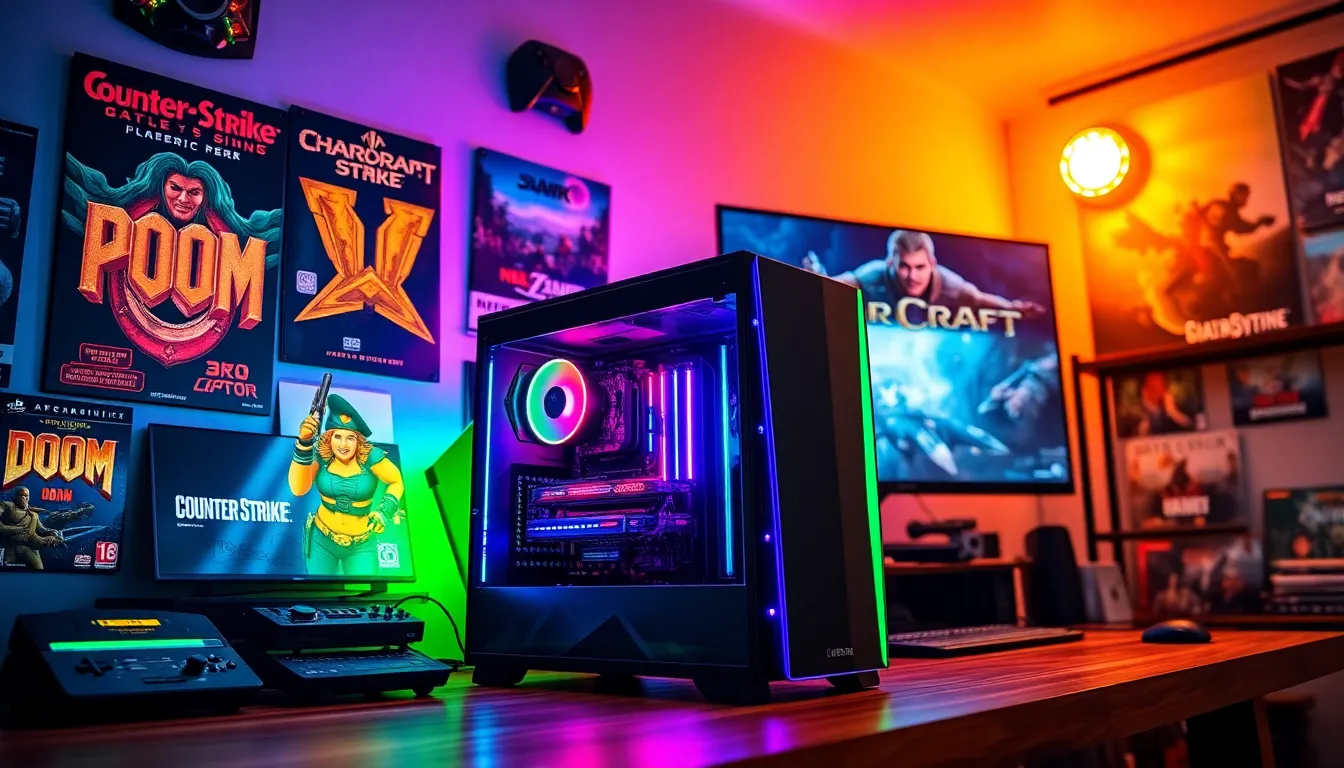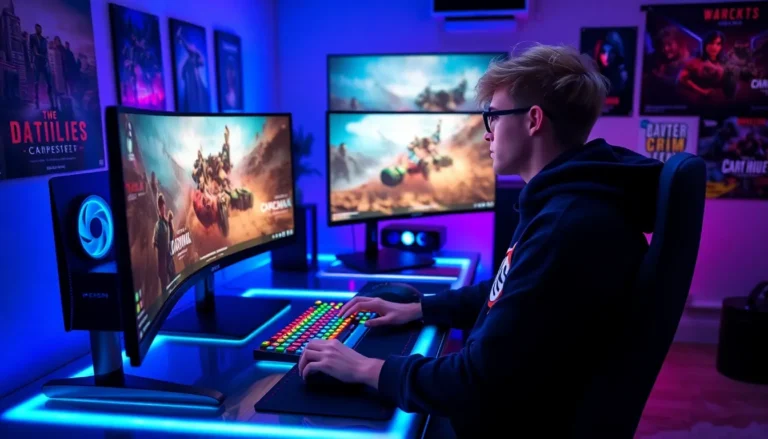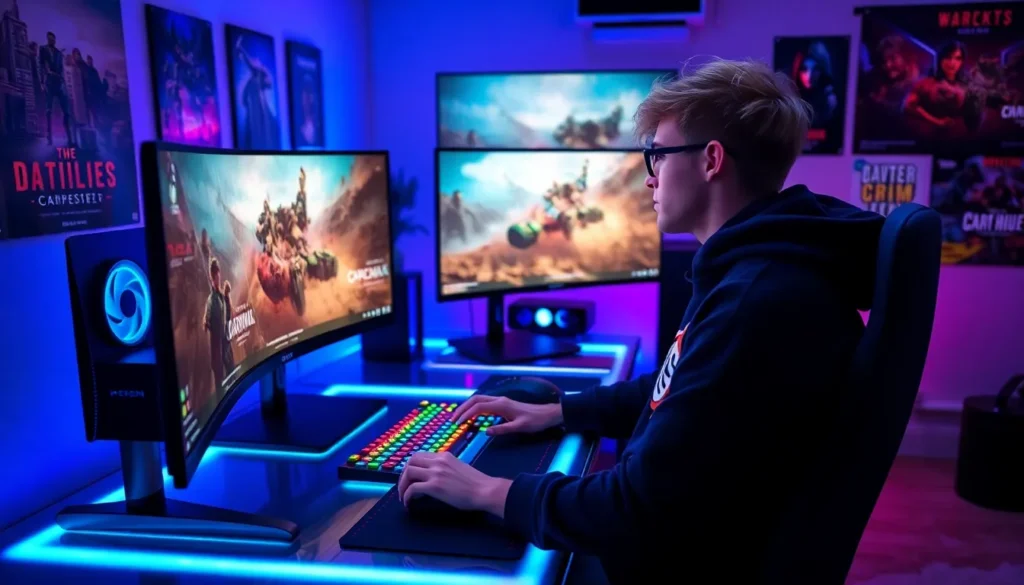Table of Contents
TogglePC gaming has become a cultural phenomenon, evolving dramatically since its inception. From its early days of humble graphics and simple gameplay mechanics to the sophisticated, immersive experiences available today, the journey has been nothing short of remarkable. This article explores the key milestones, emerging trends, and future predictions within the realm of PC gaming. Whether one is a casual gamer or a dedicated enthusiast, these insights shed light on the vibrant landscape of gaming today.
The Evolution Of PC Gaming

Key Milestones In PC Gaming History
PC gaming began in the 1970s and 80s, with games like “Pong” and “Space Invaders” marking the dawn of the industry. By the late 80s, titles like “Doom” transformed the landscape through innovative graphics and multiplayer capabilities. The 90s introduced even more milestones, such as the launch of Windows 95, which provided gamers with better compatibility and improved performance.
As technology progressed, the early 2000s saw the rise of first-person shooters (FPS) like “Counter-Strike” and real-time strategy games such as “StarCraft.” These genres not only showcased advanced software capabilities but also laid the groundwork for competitive gaming. Fast forward to the 2010s, the introduction of high-definition graphics and sophisticated game engines revolutionized gameplay and visual storytelling.
Impact Of Technology On Game Development
The advancement of technology has driven game development in significant ways. High-performance graphics cards and processors enable developers to create stunning visuals and intricate game worlds. Also, innovations in artificial intelligence (AI) enhance non-playable characters (NPCs), making them more lifelike and responsive to player actions.
Besides, cloud computing has allowed developers to optimize resources, reduce production costs, and push the boundaries of what’s possible in gaming. Modern development tools, such as Unreal Engine and Unity, empower both independent and major studios to deliver high-quality games efficiently.
The Rise Of Online Gaming Communities
How Community Shapes The Gaming Experience
Online gaming communities have fundamentally changed how people experience games. Platforms like Discord, Reddit, and Steam provide spaces for gamers to connect, share experiences, and form friendships. These interactions foster a sense of belonging that enhances the gaming experience beyond mere entertainment.
Community engagement can influence game development itself, with feedback from players helping shape updates and features. Many developers now prioritize community involvement, leading to a more collaborative environment where gamers feel valued and heard.
Top Platforms For Connecting With Other Gamers
Several platforms have emerged as go-to hubs for gamers.
- Discord: Initially created for gamers, Discord has grown to encompass various communities, providing voice channels, text chats, and integration with numerous games.
- Steam: This platform not only serves as a marketplace but also offers community features such as forums, friend lists, and groups to enhance social interaction among gamers.
- Twitch: Known for live streaming, Twitch allows gamers to showcase their skills, creating communities around shared interests and interactions between streamers and audiences.
Current Trends In PC Gaming
The Popularity Of Indie Games
In recent years, indie games have surged in popularity. Titles like “Hollow Knight” and “Celeste” redefine storytelling and gameplay mechanics, often showing more creativity than mainstream games. The rise of platforms like Steam has allowed smaller developers to reach wider audiences without the traditional barriers of entry.
Players increasingly seek unique experiences that challenge the norms of mainstream gaming, leading to an environment where innovative ideas can flourish. This trend is not just about independent developers but also about fostering diversity within the gaming community.
Embracing Virtual Reality And Augmented Reality
Virtual reality (VR) and augmented reality (AR) technologies are transforming PC gaming. VR offers immersive environments where players can physically engage with their virtual surroundings, making experiences more intense and engaging. Games like “Half-Life: Alyx” have showcased the potential of VR, attracting both dedicated gamers and newcomers.
On the other hand, AR incorporates real-world elements into gaming, bridging the gap between digital and physical realities. Titles like “Pokémon GO” have popularized AR, driving the adoption of mobile and PC gaming experiences that layer additional dimensions into gameplay.
The Future Of PC Gaming: Predictions And Speculations
Emerging Technologies To Watch
Looking ahead, several emerging technologies promise to reshape PC gaming further. One notable area is artificial intelligence, which continues to evolve. As AI becomes more sophisticated, NPCs can become more adaptive, creating deeper narratives and reactive environments. Also, advancements in graphics technology, such as ray tracing, are enhancing realism in games, making them visually stunning.
Also, quantum computing could revolutionize the gaming landscape by providing unprecedented processing power, allowing for more expansive and complex game worlds.
The Influence Of Subscription Services And Cloud Gaming
Subscription services, like Xbox Game Pass and NVIDIA GeForce Now, are changing the way gamers access titles. By offering a wide library of games for a monthly fee, these services remove barriers for players, encouraging exploration and play of games they might typically overlook.
Cloud gaming allows players to stream games without the need for powerful hardware, making high-quality gaming accessible to a broader audience. This trend could significantly impact market dynamics, potentially favoring platforms that provide exceptional service and game libraries.
Conclusion
The landscape of PC gaming is continuously evolving, driven by technological advancements, community engagement, and innovative game development. As players embrace new trends, from indie games to virtual reality, the experiences available keep expanding. With the potential of emerging technologies and subscription services on the horizon, the future of PC gaming remains bright and full of possibilities, promising even more engaging experiences for gamers of all types.







